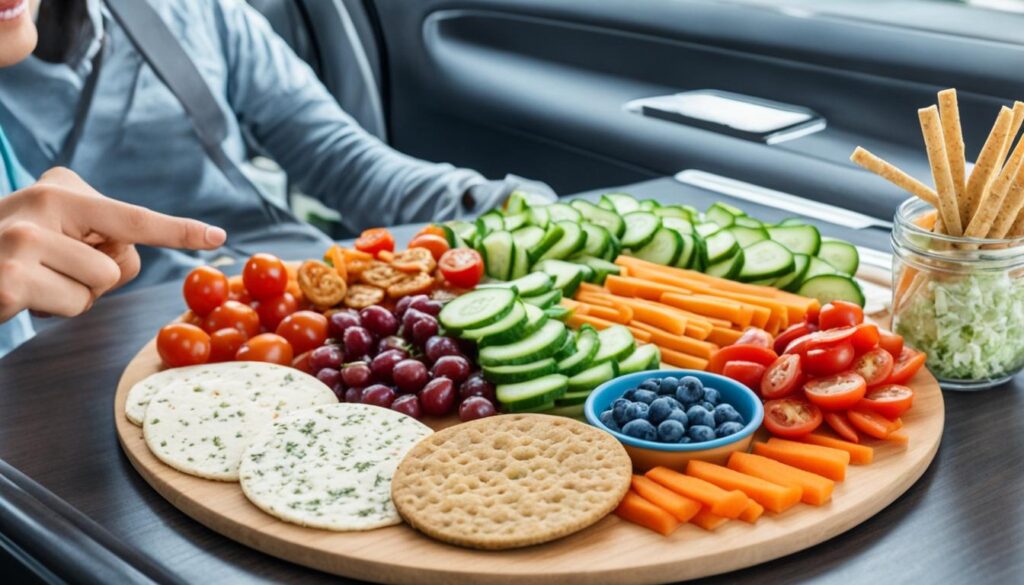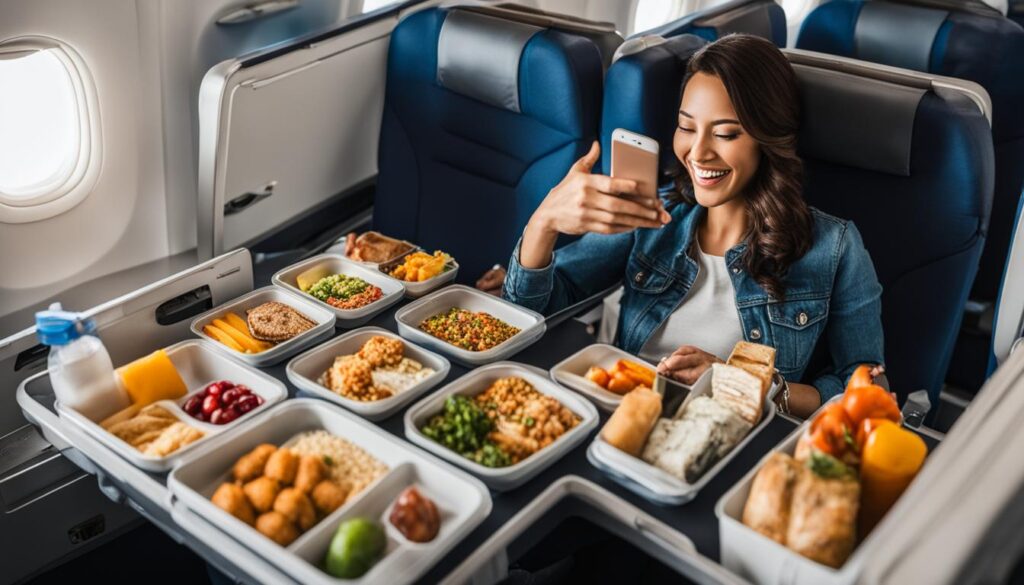Are you planning a family vacation, but struggling to accommodate everyone’s dietary restrictions? Traveling with dietary restrictions as a family can be challenging, but with the right preparation, it can be a stress-free and enjoyable experience for all. In this comprehensive family travel guide, we’ll explore how to successfully manage dietary restrictions while traveling with your loved ones.
Whether you’re dealing with food allergies, intolerances, or other special dietary needs, our guide will provide you with useful tips and tricks for planning seamless trips that cater to everyone’s health needs. From researching accommodations and restaurants to packing smart and communicating with airlines and transportation services, we’ve got you covered.
Join us on this journey to discover how you can create unforgettable memories while prioritizing your family’s health needs. Let’s explore the world together with no limitations!
Understanding the Challenge of Traveling with Dietary Restrictions as a Family
Traveling with dietary restrictions as a family can present unique challenges. Planning ahead is key to ensuring that your family vacation is stress-free.
Research family-friendly travel options that can accommodate special dietary needs. This includes lodging and restaurants that cater to dietary restrictions.
It’s also important to understand dietary limitations and how to manage them while on vacation. Take the time to educate yourself on what foods to avoid, and consider bringing safe, non-perishable snacks to munch on while traveling.
Traveling is one of life’s greatest pleasures, but it can be a challenge when dealing with dietary restrictions. With a little planning and preparation, however, it’s possible to ensure that your family travels smoothly and maintains good health along the way.
Pre-Trip Preparation: Researching Accommodations and Restaurants
When traveling with dietary restrictions as a family, researching accommodations and restaurants that cater to your specific needs before embarking on your trip is crucial. This will help avoid any unnecessary stress and ensure you have a stress-free vacation that caters to your family’s health needs.
Here are some tips for finding suitable options and making informed choices:
1. Research in advance:
Look up accommodations and restaurants that offer options suitable for your dietary restrictions well in advance. Some websites offer reviews and ratings from other travelers, which can provide additional insight into the quality and availability of options that cater to a specific diet.
2. Communicate with your hotel or accommodation:
Before booking your stay, reach out to the hotel or accommodation to inquire about the availability of options suitable for your dietary restrictions. This can help avoid any confusion or surprises during your stay and guarantee that your dietary needs are met.
3. Plan meals in advance:
Research local restaurants and cafes that offer menu options that cater to your dietary restrictions. Websites like Yelp or Google Maps can provide additional insight into the quality and availability of options that cater to a specific diet. Additionally, consider packing your food to take with you on your travels, especially if you have a strict diet that may be difficult to accommodate otherwise. Don’t forget to pack essential items like a travel-sized cutting board or portable utensils.
4. Ask for recommendations:
Ask friends or family members who may have traveled to the same destination and had similar dietary restrictions for recommendations. Additionally, you can seek recommendations from online travel forums or social media groups for like-minded travelers.
By taking these steps and preparing in advance, you can have a stress-free vacation that caters to your family’s health needs.
Packing Smart: Essential Items for Traveling with Dietary Restrictions
When traveling with dietary restrictions, proper packing is essential. Here are some must-have items to make your family trip stress-free and enjoyable:
Allergy-Friendly Snacks
Carrying your own packed snacks is wise to have backup options if you don’t find anything suitable locally. Some options include storable fruits like bananas or apples, and pre-packaged, non-perishable snacks like granola bars, fruit cups, or trail mix.
Portable Cooking Equipment
Carrying portable cooking equipment such as an electric cooker, induction plate, or mini oven can offer conveniences of preparing your meals in the comfort of your hotel room or accommodation. This way, you can ensure that there is no cross-contamination with foods that can trigger your allergies or dietary restrictions.
Reusable Containers
Safe storage containers can preserve the freshness of your cooked or packed food, keeping them fresh for more extended periods without exposing them to contamination. Consider carrying travel-sized thermos flasks, lockable reusable sandwich bags, and bento boxes to keep your food fresh for a short duration or for longer days ahead.
Medication and Supplements
Managing dietary restrictions on a trip usually requires much more preparation than following your regular diet at home. If you have dietary supplements or medications to maintain your health, make sure you pack them in a suitable, air-tight container well in advance. You can also take medications prescribed to ease any allergic reactions just in case you come into contact with allergens accidentally.
With these essential items, you can take control of managing dietary restrictions while on the go and ensure your family trip remains a happy and memorable experience.
Safe and Healthy Snack Options for Traveling Families with Special Diets
When it comes to traveling with food allergies and dietary restrictions, snacks are a must-have item to keep hungry travelers fueled throughout the journey. Fortunately, there are safe and healthy snack options available that cater to different dietary needs and preferences, including picky eaters and those with food allergies.
For gluten-free options, consider bringing along snacks like rice cakes, roasted chickpeas, apple slices with almond butter, and a variety of trail mixes featuring nuts, seeds, and dried fruits. For dairy-free options, try snacks like hummus and carrot sticks, edamame, or popcorn with nutritional yeast.
If your child has a peanut allergy, be sure to double-check all packaging to ensure snacks are safe to consume.
For a sweet treat that won’t trigger sugar crashes, consider snacks like fruit popsicles made with real fruit, homemade date or energy bars, and frozen yogurt cups made with coconut milk.
An essential snack for long flights or car rides is one that is easy to pack, transport and mess-free like crackers, granola bars, fruit cups, or raisins. Don’t forget to check the list of permitted items by the airline if you intend to carry snacks on board.
Snack Options for Traveling Families with Dietary Restrictions
| Dietary Restrictions | Snack Options |
|---|---|
| Gluten-Free | Rice cakes, roasted chickpeas, apple slices with almond butter, trail mix |
| Dairy-Free | Hummus and carrot sticks, edamame, popcorn with nutritional yeast |
| Peanut-Free | Sunflower seed butter spread on rice cakes, roasted pumpkin seeds |
| Sugar-Free | Fruit popsicles, homemade date or energy bars, frozen yogurt cups made with coconut milk |
| Nut-Free | Fruit cups, raisins, granola bars, popcorn |
Remember to always plan ahead and pack enough snacks to last throughout your journey. By doing so, you can ensure that everyone in the family will be fueled, satisfied, and happy throughout the trip.
Communicating with Airlines and Transportation Services
When managing dietary restrictions while traveling, it’s crucial to communicate your needs to airlines and other transportation services in advance. This will help them prepare for your family’s requirements and ensure a smooth journey.
Most airlines offer special meals for passengers with dietary restrictions, but it’s important to request them in advance, typically at least 24 hours before your flight. When booking your tickets, you can indicate your dietary restrictions through the airline’s website or by calling their customer service center.
During the flight, make sure to remind the flight attendants and double-check that your special meal is being served. If you have any doubts, it’s always better to ask for clarification.
If you’re traveling by other transportation services, such as trains or buses, make sure to research their policies and options for accommodating dietary restrictions. Some services may require additional communication or documentation, so plan accordingly.
Remember to pack snacks and other essential items in case the provided meals don’t meet your family’s needs.
Key takeaways:
- Communicate your dietary restrictions to airlines and transportation services in advance.
- Request special meals at least 24 hours before the flight.
- Remind the flight attendants during the flight and double-check that your special meal is being served.
- Research policies and options for accommodating dietary restrictions for other transportation services.
- Pack snacks and other essential items in case the provided meals don’t meet your family’s needs.
Exploring Local Cuisine: Adapting and Ordering with Special Requests
Part of the joy of traveling as a family is experiencing local cuisine. However, navigating food restrictions on family trips can be challenging. Fortunately, with a little creativity and forward planning, adapting and ordering meals with special dietary requests is possible, while still savoring the flavors of the destination.
Here are some family travel tips for dietary restrictions:
- Research local cuisine and ingredients before your trip to familiarize yourself with what to expect.
- Consider choosing restaurants that allow you to customize your meals or have a good selection of vegetarian or vegan dishes.
- If you are traveling to a foreign country, learn essential phrases and vocabulary related to your dietary restrictions to help you communicate with the locals.
- Contact your hotel or accommodations in advance to inquire about special requests or alternative meal options.
- Bring along a small card or document detailing your dietary restrictions in the local language. This can help in communicating with restaurant staff or vendors.
Most restaurants are more than happy to accommodate special requests, particularly if you communicate your needs clearly and politely. Don’t hesitate to ask questions about the ingredients or preparation methods, or suggest alternatives that the chef can consider. It’s always better to be safe than sorry when it comes to managing food restrictions on family trips.
Pro tip: Inquire about local food markets or grocery stores that carry specialty items that cater to your dietary restrictions. This can allow you to prepare simple meals in your accommodations or have snacks on hand while exploring the destination.
| Destination | Local Dish | Adaptation |
|---|---|---|
| Japan | Sushi and Sashimi | Request for gluten-free soy sauce or substitute with tamari |
| Mexico | Tacos | Order with corn tortillas instead of flour tortillas for a gluten-free option |
| India | Curry | Request for dairy-free or vegetarian options |
Don’t let dietary restrictions hold your family back from enjoying the local cuisine during your travels. With some preparation and communication, you can adapt and enjoy delicious meals while still managing your health needs.
Maintaining a Balanced Diet: Tips for Nutritional Needs on the Go
Managing dietary restrictions while traveling can be a challenge, but it’s essential to maintain a balanced diet for optimal health. Here are some tips for incorporating essential nutrients into your family’s meals on the go:
| Tip | Description |
|---|---|
| Plan Ahead | Research local supermarkets and farmers markets to stock up on fresh produce and other healthy staples. This can save you money and ensure you have healthy options on hand. |
| Choose Smart Snacks | Opt for protein-rich snacks like nuts and seeds, and fruits like berries and bananas. Avoid sugary snacks and processed foods, which can cause energy crashes and leave you feeling sluggish. |
| Stay Hydrated | Carry a refillable water bottle with you and drink regularly throughout the day to avoid dehydration. Coconut water and sports drinks can also help replenish electrolytes lost during travel. |
| Use Portion Control | It’s easy to overeat while on vacation, but remember that portion control is key to maintaining a balanced diet. Use smaller plates and containers to avoid overindulging. |
| Get Creative with Meals | Experiment with healthy meal ideas that incorporate local ingredients and cultural flavors. Get your family involved in the process by planning and cooking meals together. |
Remember, managing dietary restrictions while traveling doesn’t have to be stressful. With a little planning and creativity, you can maintain a balanced diet and still enjoy your family vacation.
Handling Food Allergies and Emergencies During Family Travel
When traveling with food allergies and dietary restrictions, it’s important to be prepared for emergencies. Here are some strategies to manage allergies and stay safe while traveling with your family:
- Research Emergency Medical Services: Before traveling, research local hospitals and emergency medical services in case of an allergic reaction or emergency.
- Carry Emergency Medications: Make sure to pack all necessary medications, such as epinephrine injectors, antihistamine medication, inhalers, and any other prescribed medications. Keep them in your carry-on bag, and carry a backup supply just in case.
- Communicate with Your Accommodations: If you’re staying in a hotel or rented accommodation, inform them of any food allergies and ask for assistance in accommodating your needs.
- Inform Your Travel Companions: Ensure that everyone in your travel party is aware of your dietary restrictions and emergency plans, and educate them on how to use emergency medications in case of an allergic reaction.
Remember to always carry and wear medical identification bracelets that clearly state your allergies or health conditions. In case of an emergency, these can be lifesaving.
Tip: If you’re unsure about the ingredients of local foods, it’s better to err on the side of caution and stick to foods that you know are safe.
Cultural Sensitivity: Navigating Dietary Restrictions Abroad
Traveling internationally can expose your family to new cultures and experiences. It’s vital to respect local customs while still managing your dietary restrictions. Here are a few tips to make your trip more enjoyable:
Research Before You Depart
Learn about the local cuisine and look for dishes that meet your needs. Look for any unusual ingredients or preparation methods, and investigate any opportunities for cross-contamination. If you’re unsure, ask the servers or chefs if they can accommodate your requests.
Communicate Your Needs
Be clear with waitstaff or hosts about your food sensitivities, as some dietary restrictions vary from culture to culture. Take note of how they prepare meals and communicate any specific requests with a smile. Additionally, learn how to say phrases like “I have an allergy” in the local language to avoid misunderstandings.
Be Open to New Foods
While it’s important to maintain your dietary needs, try to embrace the local flavors, and be open-minded about trying new dishes. If you are unsure of the ingredients or preparation, ask your server or chef for more details. You might find something new and delicious that you wouldn’t have tried otherwise.
“Respect the local customs and be clear with the hosts about your dietary restrictions.”
Remember, cultural differences may sometimes cause unexpected challenges when traveling, especially when it comes to managing dietary restrictions while abroad. By showing respect for local customs and proactively communicating your needs, you can make the most of your travels while still managing your dietary restrictions.
Conclusion
In conclusion, traveling with dietary restrictions as a family may seem daunting, but with proper planning and communication, it can be a stress-free and enjoyable experience. Remember to research accommodations and restaurants ahead of time, pack essential items, communicate with airlines and transportation services, and adapt to local cuisine while maintaining a balanced diet.
Handling food allergies and emergencies during family travel requires careful preparation, so make sure to carry emergency medications and communicate effectively with local healthcare providers. When traveling internationally, be culturally sensitive while adhering to your dietary restrictions.
By following the tips provided in this comprehensive family travel guide, you can create unforgettable memories while prioritizing everyone’s health needs. Bon voyage!

















































